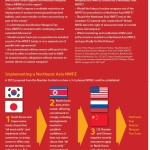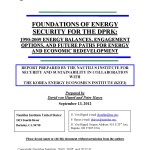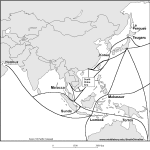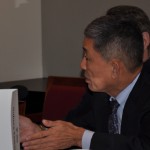David von Hippel Energy security in general, nuclear energy in particular, and nuclear weapons proliferation are issues that are never far from the news in Northeast Asia (NEA), and recent months have been no exception. Negotiations continue on a new version of the existing US-ROK nuclear energy cooperation, which is set to expire in […]
Archives
A Breakthrough Six-Party Summit in 2013? Why Not?

Efforts to get North Korea to give up its nuclear program and to resolve the outstanding security issues that plague the search for peace on the Korean Peninsula seem intractable. The Six-Party talks appear hopelessly stalled, and yet, among forward-thinking policymakers, the search is under way for how to reign in the North Korean nuclear threat.
Nautilus Institute Director Peter Hayes examines one proposal by noted American foreign policy expert Mortin Halperin that may contain just the right ingredients for a comprehensive solution, now that all parties to the Six-Party talks are beginning 2013 with new governments.
Peter Hayes is Director of the Nautilus Institute and a member of the Editorial Board of Global Asia. He is also Adjunct Professor of International Relations at RMIT University.
This article was originally published in Global Asia’s 2012 Winter Edition (Volume 7 Number 4).
Nautilus Peace and Security Weekly – 20 December 2012
- DETERRENCE: The social impact of bomb destruction
- DPRK: Foundations of energy security for the DPRK
- ENERGY SECURITY: Coal’s share of global energy mix to continue rising
- GOVERNANCE AND CIVIL SOCIETY: Korea elects first woman president
- CLIMATE CHANGE ADAPTATION: Building
climate resilience - CLIMATE CHANGE AND SECURITY: Worst fortnight ever for carbon markets?
Climate adaptation challenges for Pakistan

Climate adaptation challenges for Pakistan
by Saleem Janjua – Climate Change Adaptation Contributor
Pakistan, similar to other developing countries, is undergoing an evolution from an…
Foundations of Energy Security for the DPRK: 1990-2009 Energy Balances, Engagement Options, and Future Paths for Energy and Economic Redevelopment

The purpose of this report is to provide policy-makers and other interested parties with an overview of the demand for and supply of the various forms of energy used in the DPRK in six years during the last two decades:
- 1990, the year before much of the DPRK’s economic and technical support from the Soviet Union was withdrawn;
- 1996, thought by some to be one of the most meager years of the difficult economic 1990s in the DPRK; and
- 2000, a year that has been perceived by some observers as a period of modest economic “recovery” in the DPRK, as well as a marker of the period before the start, in late 2002, of a period of renewed political conflict between the DPRK, the United States, and it neighbors in Northeast Asia over the DPRK’s nuclear weapons development program; and
- 2005, also a year in which observers have again noted an upward trend in some aspects of the DPRK economy, as well as the most recent year for which any published estimates on the DPRK’s energy sector and economy are available.
- 2008, the last year in which the DPRK received heavy fuel oil from its negotiating partners in the Six-Party talks; and
- 2009, the most recent year for which we have analyzed the DPRK’s energy sector.
David von Hippel is an Associate of the Nautilus Institute. Peter Hayes is the Executive Director of the Nautilus Institute.
Nautilus Peace and Security Weekly – 13 December 2012
- DETERRENCE: New Chinese leader meets military nu…
Shining Missile, Troubled Shipping

Shining Missile, Troubled Shipping
by Roger Cavazos – DPRK Contributor
OK, North Korea successfully launched a missile/rocket and stole the spotlight again like a shaman chanting wild…
The “Joint Facilities” Revisited – Desmond Ball, Democratic Debate on Security, and the Human Interest

Richard Tanter examines Ball’s writings on these facilities, setting them in the wider context of Ball’s work on nuclear targeting, the transnational UKUSA intelligence and security community, and the possibilities and limits of self reliance in Australian defence. Reviewing developments in US-Australian “joint facilities” in Australia in the past decade, the paper examines the asymmetrical alliance cooperation involved in the technological, organisational and doctrinal integration of Australian defence forces with those of the United States. It then argues for a reconsideration of the balance of costs and benefits of the US facilities and the accompanying alliance grand bargain. The paper concludes with a re-consideration of Ball’s reluctant conclusion to the question of whether, on balance, the retention of the Joint Defence Facility Pine Gap is in the Australian national interest and the wider human interest.
Richard Tanter is Senior Research Associate at the Nautilus Institute, and professor in the School of Social and Political Studies at the University of Melbourne. Email: rtanter@nautilus.org.
Nautilus Peace and Security Weekly – 6 December 2012
- DETERRENCE: China conducts flight landing on aircraft carrier
- DPRK: N. Korea’s rocket launch ‘baptism by fire’ for China’s new leadership
- ENERGY SECURITY: Global water crisis: too little, too much, or lack of a plan?
- GOVERNANCE AND CIVIL SOCIETY: Poll shows strains in China-Japan-S. Korea ties
- CLIMATE CHANGE ADAPTATION: Climate change vulnerability and the identification of least developed countries
- CLIMATE CHANGE AND SECURITY: Climate change, migration, and conflict in South Asia: rising tensions and policy options across the subcontinent
U.S. “Rebalancing” as an Opportunity for a NWFZ in Northeast Asia

Lieutenant General (Ret.) Noboru Yamaguchi states that U.S. “rebalancing” toward the Asia-Pacific region, if properly implemented, “could provide a tremendous opportunity for allied deterrence and defense to become less reliant on nuclear weapons”. To achieve this Yamaguchi suggests that ““rebalancing” should strengthen U.S. conventional deterrence while the defense posture maintained by its allies should be consonant with such US efforts. This convergence will result in a more reliable allied deterrence posture. and thus U.S. extended deterrence may not have to rely much, if at all, on nuclear weapons to dissuade possible opponents in the region from being aggressive.”
Lieutenant General (Ret.) Noboru Yamaguchi is currently a professor of military history and strategy at the National Defense Academy of Japan.
This report was originally presented at the New Approach to Security in Northeast Asia: Breaking the Gridlock workshop held on October 9th and 10th, 2012 in Washington, DC.

